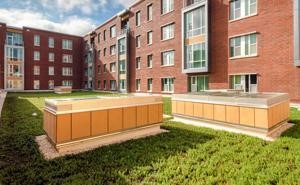New campus apartments awarded sustainability certification


NC State University’s Wolf Ridge Student Apartments are the newest student housing on campus as well as the most sustainable.
The apartments, which opened in August 2014, recently received certification for Leadership in Energy and Environmental Design (LEED) at the Silver level.
“Sustainability was at the forefront of every design and construction decision made throughout the duration of the Wolf Ridge project. This focus resulted in a sustainable property that reflects the university’s commitment to sustainability,” said Pete Fraccaroli, director of facilities for Campus Life.
In addition to providing increased on-campus housing capacity for students, Wolf Ridge is strategically located on Centennial Campus next to the growing College of Engineering, which enrolls about one fourth of NC State’s student population. Wolf Ridge is also the home of the Andy and Jane Allbright Entrepreneurs Village in Innovation Hall – the first living and learning village on Centennial Campus.
The complex’s energy-efficiency features include Energy Star kitchen appliances, complex metering that makes possible dashboards that display real-time building energy use, and occupancy sensors to automatically control lighting. The facility includes 68 outdoor LED (light emitting diode) lamps as well as 4,182 indoor LEDs that save 95,000 kilowatt hours of energy annually, about the equivalent of saving 2,800 gallons of gasoline.

Rooms are equipped with low-flow plumbing fixtures, efficient ceiling fans, plentiful windows allowing for daylighting, recycling bins and carpet made from partially recycled content. Indoor air quality is maximized through the use of low-VOC paint and sealants.
Outside, the apartments boast native plants, reforested areas, bus stops and bicycle racks to encourage alternative transportation, greenways, a green roof, and a 50,000-gallon cistern that collects rainwater and 345,000 gallons annually of condensate from the buildings’ HVAC systems.
In addition to providing much-needed student housing on campus, the construction of Wolf Ridge also boosted the regional economy with 40 percent of the building’s construction materials purchased from within 500 miles of campus.
“Throughout the past 10 years, University Housing has made a commitment to sustainable efforts,” said Tim Blair, associate director of University Housing. “Even our oldest [residence] halls have been retrofitted with water-saving fixtures and more efficient energy systems. Wolf Ridge provided the unique opportunity for us to be intentional about sustainability from the very beginning”.